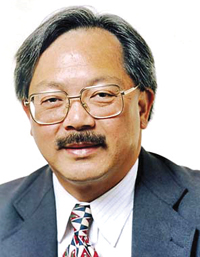By Lisa Leff
The Associated Press

Ed Lee
SAN FRANCISCO (AP) — As interim mayor of San Francisco, veteran civil servant Edwin Lee enjoyed several advantages that kept him safe in a city where the politics can be as punishing as the undulating streets.
But in the five minutes it took him to take out election papers and reverse his pledge not to seek the mayor’s post this November, political observers say Lee may have sacrificed the very safeguards that have made him the instant frontrunner in a crowded field, which includes his ability to get along with the famously fractious Board of Supervisors, his reputation as an unassuming bureaucrat, and his capacity to focus on running the city instead of campaigning.
“When he was just a caretaker, he didn’t have to pick sides and he didn’t have to make alliances. He had the honeymoon period where he didn’t have to be a politician,” Johnny Wang, a political consultant unaffiliated with any of the mayoral candidates, said. “By getting in, two negatives are going to happen. One is every candidate is going to be gunning for him. Two, he has to take stances and with every stance he takes, he will be choosing friends and enemies.”
In January, San Francisco lawmakers unanimously named Lee, 59, an administrator with more than two decades in local government, to serve out the remainder of Mayor Gavin Newsom’s second term after Newsom was elected California’s lieutenant governor. The appointment was conditioned on Lee not becoming a candidate, since four current and former supervisors already had their eyes on the job.
Lee insisted as recently as late June that he wasn’t interested, even after supporters started circulating petitions and raising money to persuade him to change his mind.
With former Mayor Willie Brown and U.S. Sen. Dianne Feinstein, another former mayor, among those calling for him to jump in, Lee’s insistence grew less steadfast until he entered the race last week.
Evidence that the city’s first Asian American mayor has gone from untouchable to Target No. 1 sizzled during a debate last week on Thursday night among nine of the leading candidates (17 had entered the race as of Friday’s filing deadline).
The moderator, San Francisco Examiner columnist Melissa Griffin, called Lee’s evolution from caretaker to candidate “an elephant in the room” and asked him point-blank to explain why he should not be considered an untrustworthy liar.
Lee, after thanking her for the question with a chuckle, explained that he was proud of his seven-month record, particularly “the civility, the civil tone we have created at City Hall,” and wanted to build on it.
Decorum, though, was not the top concern of several fellow candidates, who pounced when given the opportunity.
“I do regret I took Ed Lee at his word when he said he would not run,” board president and fellow mayoral candidate David Chiu said, quipping that their first one-on-one meeting since Lee joined the race “felt a little bit like meeting an ex-girlfriend after a breakup.”
Asked to name “the most unpardonable sin a politician can commit,” City Attorney Dennis Herrera made a full-throated attack on lying.
“It’s incredibly important we stick to our word because it’s the only way we can establish trust in terms of how we deal with each other as elected officials and in government,” Herrera said. “When you don’t keep your word and you don’t live up to your word, I think there isn’t anything more corrosive of the public trust.”
It remains to be seen whether voters share the indignation of Lee’s competitors or if the “broken promise” card has a shelf life that expires by Labor Day. The consensus among political observers is that at this early stage, the race is Lee’s to lose.
Meanwhile, Chinatown leaders have issued a plea to Chiu and the other Asian Americans in the race, like State Sen. Leland Yee, city’s assessor Phil Ting, and public defender Jeff Adachi, urging them to refrain from negative campaigning.
“There aren’t ordinary citizens wandering around San Francisco shaking their heads and being disappointed at Ed Lee for changing his mind,” said Nathan Ballard, a Democratic strategist and former Newsom spokesman who is remaining neutral. “He has done the right thing by immediately showing up at mayoral debates, which shows his willingness to explain himself, where he very well could be running a Rose Garden campaign, where he stays within the confines of the mayor’s office, issues proclamations, and attends ribbon cuttings and coasts to victory.”
One potential stumbling block to an easy Lee victory is the city’s ranked-choice voting system, which allows voters to select up to three candidates for a single office. If no candidate receives a majority of first-choice selections, the last-place candidate is eliminated and voters who chose that candidate have their votes transferred to their second-choice candidate — a process that repeats until one candidate receives more than 50 percent.
To win under such a system, which is designed to eliminate a run-off election, the winning candidate needs to have both a strong core of support to bring in top rankings and a broad base of support to secure enough No. 2 and No. 3 spots, said political reform advocate Steven Hill, who ran the campaign that brought ranked-choice voting to San Francisco in 2004.
At this stage, it’s unclear just how deep Lee’s support reaches in either category, since he has never run for elected office before or been subject to the scrutiny of opposition research, Hill said.
“He may find this is not to his liking at all as people attack his integrity, which is what his whole candidate persona is based on,” he said. ♦



